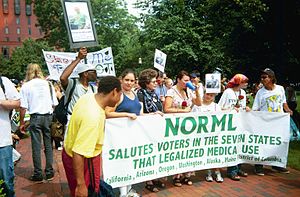This article may require cleanup to meet Wikipedia's quality standards. The specific problem is: "Barr Amendment" section spliced in from other article, needs improved focus and flow. (February 2015) |
Initiative 59 was a 1998 ballot initiative in Washington, D.C., that sought to legalize medical cannabis. The short title of the initiative was "Legalization of Marijuana for Medical Treatment Initiative of 1998".[1] Though the initiative passed with 69% of the vote in November 1998, its implementation was delayed by Congress's passage of the Barr Amendment, which prohibited DC from using its funds in support of the program. This Amendment delayed the start of the medical marijuana program until it was effectively overturned in 2009, with the first DC customer legally purchasing medical cannabis at a dispensary in the District in 2013.[2]

Barr Amendment
editIn 1998, Georgia Congressman Bob Barr successfully blocked implementation of Initiative 59[3] – the "Legalization of Marijuana for Medical Treatment Initiative of 1998" – which would have legalized medical marijuana in Washington, D.C.[4] The "Barr Amendment" to the 1999 Omnibus spending bill not only blocked implementation of Initiative 59, but also prohibited the vote tally from even being released.[4][5] Nearly a year passed before a lawsuit[6] filed by the American Civil Liberties Union eventually revealed the initiative had received 69% of the vote.[7] In response to the judge's ruling,[8] Barr attached another "Barr Amendment" to the 2000 Omnibus spending bill that overturned Initiative 59 outright.[9] The Barr Amendment also prohibited future laws that would "decrease the penalties for marijuana or other Schedule I drugs" in Washington, D.C.[10] This preemptively blocked future attempts by Marijuana Policy Project (MPP) to reform marijuana laws in DC via the initiative process.[10] In March 2002, U.S. District Judge Emmet Sullivan struck down this portion of the Barr Amendment as being an unconstitutional restriction on free speech.[10][11] Barr criticized the ruling, arguing the court had ignored Congress' constitutional right to pass laws protecting citizens from "dangerous and addictive narcotics."[12]
The federal government later prevailed on appeal,[12] reinstating the Barr Amendment just in time to thwart MPP's initiative 63 – "The Medical Marijuana Initiative of 2002" – which had already qualified for the November 2002 ballot.[13][14] In 2009, both the United States Senate and House of Representatives voted to lift the ban against a medical marijuana initiative, effectively overturning the Barr Amendment.[15]
Initiative 71 and legalization of recreational cannabis
editThe legalization of non-commercial possession and cultivation of recreational marijuana was voted in the following year through Initiative 71 in 2014.
See also
edit- Cannabis in the United States#District of Columbia
- Decriminalization of non-medical cannabis in the United States#District of Columbia
- Timeline of cannabis legalization in the United States#Municipal
- Legal history of cannabis in the United States#State-level legalization
- Initiatives and referendums in the District of Columbia
References
edit- ^ "Ballot Initiative 59". The Washington Post. Retrieved 2017-06-02.
- ^ Altieri, Erik (2013-07-30). "First Medical Marijuana Sale Reported in Washington, DC". NORML. Retrieved 2017-06-02.
- ^ "Text of Initiative 59". Prop1.org. Retrieved 2013-08-24.
- ^ a b Twomey, Steve (1998-11-23). "On the Hill, Barring Democracy". The Washington Post. p. B01. Retrieved 2008-04-25.
- ^ Slevin, Peter; Murphy, Caryle (1998-11-04). "Marijuana Vote Results Kept Secret". The Washington Post. p. A37. Retrieved 2008-04-25.
- ^ "Turner v. DC Board of Elections, ACLU Complaint | American Civil Liberties Union". Aclu.org. 1998-10-30. Retrieved 2013-08-24.
- ^ "DC Medical Marijuana Initiative 59 – Landslide Win" (Press release). ACT UP-DC. 1999-09-21. Retrieved 2008-04-25.
- ^ "Turner v. DC Board of Elections, Court Decision | American Civil Liberties Union". Aclu.org. 1999-09-17. Retrieved 2013-08-24.
- ^ "Democracy Held Hostage". ACLU Drug Law Reform Project. American Civil Liberties Union. 2000-12-31. Retrieved 2008-04-25.
- ^ a b c "Battle Over Medical Marijuana in D.C. Moves to Appeals Court" (Press release). Marijuana Policy Project. Archived from the original on 2008-09-18. Retrieved 2008-05-20.
- ^ Marijuana Policy Project v. D.C. Board of Elections and Ethics (United States District Court for the District of Columbia 2002-03-22), Text.
- ^ a b Marijuana Policy Project v. United States of America (United States Court of Appeals for the District of Columbia Circuit 2002-09-19), Text.
- ^ "D.C. Medical Marijuana Initiative". District of Columbia Legislation. Marijuana Policy Project. Archived from the original on September 18, 2008. Retrieved 2008-05-20.
- ^ "Timeline of Initiative Events". District of Columbia Legislation. Marijuana Policy Project. Archived from the original on September 18, 2008. Retrieved 2008-05-20.
- ^ "Congress Lifts Ban on Medical Marijuana for Nation's Capitol". Federal Advocacy Project. Americans for Safe Access. Archived from the original on 2009-12-22. Retrieved 2009-12-15.